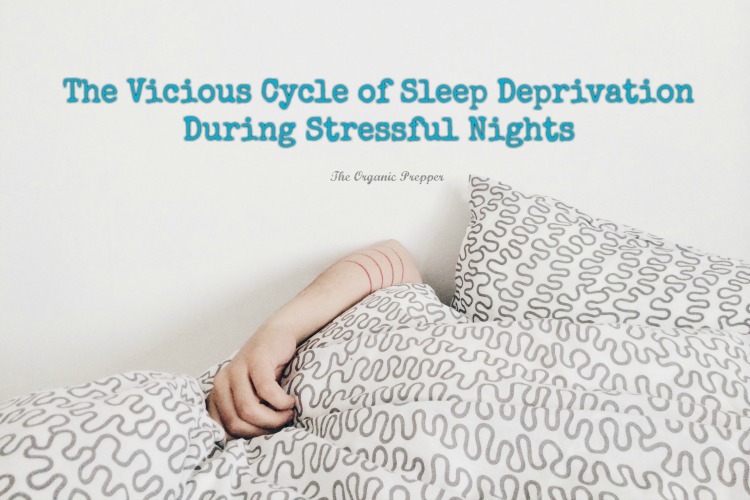If you're new here, you may want to subscribe to my RSS feed. Thanks for visiting!
by Mike Brice
Changing your life isn’t easy, especially if it involves radical turnarounds. You have to learn new things and adjust to a lifestyle which was probably utterly unknown to you. That can generate a lot of worries, stress and even lack of sleep. I had my share of sleepless nights when thinking if I was on the right path.
But stress is a component of our life even if we don’t radically change it. Hard work, unsatisfying jobs, shallow relationships, hardships in life, or not following our dreams – these are all potential sources of worrying and stress. And then we find ourselves in a vicious cycle of stressful days and nights which lead to insomnia which generates more anxiety. This circle can become an ongoing “carousel of exhaustion,” which will have a disastrous impact on our well-being. There’s a reason that sleep deprivation is used as a form of advanced interrogation.
Being prepared to survive in any circumstances involves knowing how to exit this vicious cycle. To achieve that purpose, we first need to know the truth about the connection between lack of sleep and stress. I’ve read many studies on this topic and here’s what I’ve learned.
The effects of sleep deprivation
When sleep passes you by, you are prone to one or more of the following long-term effects:
- Cognitive impairment (mild to moderate)
- Emotional irritability, anger, changing moods and constant fatigue
- Motor skill damage
- Weight gain, even obesity – which could lead to heart diseases or type-2 diabetes
- Weakened immune system
The consequences are not hard to guess:
- A diminished mental sharpness will compromise your academic or work performance, but also your abilities to survive off-grid or in a non-familiar situation.
- A weakened immune system will lead to your getting sick more often, which will generate additional pressure and stress.
- Emotional irritability will cause conflicts with your family members, your colleagues or even strangers, which could lead to unpredictable problems and a discordant atmosphere.
- Lack of sleep also makes you more predisposed to various accidents, which is not something you wish to happen, especially when you’re doing everything on your own.
Stress messes up sleep. Lack of sleep induces stress.
Even if the events happening in your life may seem not stressful to others, what matters (and influences you) is the degree to which you believe that they are disturbing and nerve-racking for you. That is what generates insomnia and all those problems I’ve just mentioned. And lack of sleep produces higher levels of stress. There’s the vicious circle I was referring to earlier.
People who are sleep deprived experience higher levels of stress and psychological tension. In a situation that is already stressful, it will just make matters worse.
What can we do to avoid or escape that circle?
The best advice for sleep is to let all your worries go away and unwind before bedtime. Try a few tricks to make that happen:
- Do some light exercising, preferably outdoors, at least half an hour before going to bed. Even a short and calming walk can change your mood.
- Drink some chamomile tea. It will help you relax.
- Craft something with your hands. From my experience, that is an excellent way to free the mind and prepare the body for a peaceful sleep.
- Simple breathing exercises perform wonders for our body and brain. You could also try yoga and meditation techniques, especially if you can do them in nature. I’m no expert, but when I need to relax before bed, I close my eyes and think of beautiful memories from my life or imagine a peaceful place where I feel safe and serene.
- Don’t burden your body by overeating, mainly in the evening. Grab a healthy snack at least an hour before bedtime or have a glass of warm milk.
Some of these things may sound more easily said than done, but if you create good sleep habits now, they will help you adapt better during a stressful time during which sleep is more important than ever.
How do you get to sleep?
Do you have any tricks for getting to sleep faster? Share them in the comments section.
About the Author
Mike Brice graduated from the University of Illinois at Urbana–Champaign. His hobby has always been to explore the science behind sleep.


















… my two cents. Having a set time to go to sleep and rise, and a regular place to sleep, helps. It takes a few days to get into the habit. Fifteen minute naps might help.
Recently I learned we sleep in blocks of an hour and a half, ninety minutes. (Roughly five to six in an eight/ nine period corresponding roughly to our REM cycles.) If a block is interrupted, not good. The deepest REM or dream state is, or used to be, the last block which was often the one interrupted by an alarm clock. Set the alarm at the end of a ninety cycle. And no drinking or eating at least three hours beforehand to avoid going to the bathroom or acid reflux.
Old Behavioral Therapy technique was to tense parts of the body, hands, toes, and then slowly release the tension. Coupled with imagining being in an open field* beach or sky to let go of negative sensations. A sort of pseudo Tibet Buddhist exercise was to concentrate on a neutral object like a letter, ie. “a”, while letting any thoughts drift in and out your attention like clouds. Long story: I used to read the “Tibetan Book of Living & Dying” a chapter a night and due to my limited attention span drift off into a relaxing sleep, only to be woken up by a loud booming sound. Later I found out the sound was the blood circulating in my ears and not breaking any in-between Bardo barrier, sic. It does work. Whatever you read/see before sleeping you will dream about.
Or, listen to a politician talk. How anyone can talk for twenty minutes and not say anything puts me to sleep.
Or, there’s always occasionally taking Melatonin.
… or, learn to sleep in three-hour blocks since most likely when SHTF we’ll be doing guard duty 24/7.
*Song “Spill The Wine”
(with Eric Burdon)
(1) softly repeat “let go” to myself over and over again. Usually asleep in 5-10 mins
(2) count from 100 to 1 and 1 to 100 at the same time (100, 1; 99, 2; 98, 3, etc)
When you screw up (you will – I only ever for to the end one time before falling asleep) start over again
This pretty much flushes out all the other thoughts from your mind and next thing you know, you’re asleep.
Not using electronic devices for at least an hour before bedtime is supposed to be good, because the light from the screen messes up your sleep cycle. (I say supposed because it’s the only time I have to check my email.) I’ve also used antihistamines to knock myself out but you can wake up feeling hungover. Valerian is good too and catnip tea is an old timey remedy. Identifying and eliminating stressors if possible will help most of all.
Herbal sleeping aids help. Also, turning on a podcast (about a noncontroversial subject) that will run for 60 minutes (not all night). I rarely am awake at the end of the podcast.